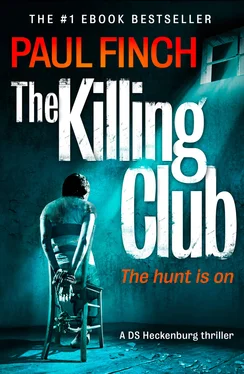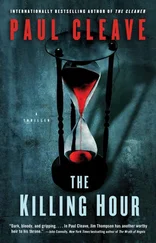‘He’s crippled,’ she said. ‘So he needs a stick. To deny him that would be to deny him his basic human rights.’
Heck snorted as he drained his mug. ‘Human rights … he’s lucky he wasn’t in Gull Rock fifty years ago, when it was all treadmills and whipping-posts.’
‘Take it from me, Heck, there isn’t much happens around Mad Mike Silver that has anything to do with luck.’
‘Is he still stonewalling you?’
‘What else?’
‘So he hasn’t even dropped any of the bit-players our way yet … like Jim Laycock for instance?’
‘Even if he had, which he hasn’t – because the Laycock link is a total non-starter, Heck – I wouldn’t tell you .’
‘And no leads on Nice Guys’ underbosses overseas? Nice Guys’ operational bases? Dumping grounds for Nice Guys’ victims in the Baltic, the Med, the Caspian …?’
‘Heck, stop … okay!’
‘Well, you know my feelings on Mad Mike …’
‘Course I do. Which is why you’re going nowhere near him. Ever again.’
Heck put his bottle away, took his mug to the sink and washed it. ‘We’re all law-abiding people in here, ma’am.’ He grabbed up the few bits of paperwork he’d actually come in for, and crammed them into his sports bag. ‘We have a system, and we stick to it. We respect all human life – that’s why we do what we do.’ He headed for the DO door, turning once before leaving. ‘But there are definitely times when a lamppost and a good piece of rope wouldn’t go amiss.’
Gemma let that pass, nodding as he waved goodbye and listening to his footfalls recede down the corridor. Eventually, after the lift doors had slid shut, she walked back to her own office, where she closed the door behind her and stood staring at the mobile phone on her desk. Waiting tensely for a call which, in all honesty, she hoped would never come.
It was just before midnight on September 19 when alarm sirens began sounding through the concrete corridors of the medical wing at HM Prison Brancaster, amber lights flashing at each electronically sealed checkpoint, the wards going into lockdown as the officers’ hobnailed boots hammered up and down stairs and gangways.
Medical emergencies were not uncommon in a jail where the inmates were exclusively the most volatile and unstable in the penal system. Despite Gull Rock’s tough but on-the-whole progressive regime, violent assaults among prisoners were a daily event, suicides occurred with regularity, and homicides were not infrequent. On top of that, there was grave ill-health: STDs were transmitted widely, while drugs were still smuggled in and often led to ODs; there were also a number of older men housed there – full-term lifers now in their seventies and eighties.
The upshot was that, though medical staff responded swiftly and efficiently if they thought someone might die, staff from other parts of the prison almost never came running.
Until now.
Until word got around that the casualty on this occasion was Inmate 87156544, real name Peter Rochester, also known as ‘Mad Mike Silver’.
For quite some time, Peter Rochester had been Britain’s unofficial Public Enemy Number One, and where the tabloids were concerned, a hate-figure on a par with Osama bin Laden. Even the chattering classes, those who habitually attempted to grapple with the psychology of ultra-dangerous offenders rather than condemn them outright, had difficulty finding anything positive to say about him. The problem was Rochester’s intellect. He wasn’t some drooling madman; he wasn’t bipolar; he wasn’t schizophrenic; he didn’t have mummy issues. He was quite clearly a psychopath – but of the most organised and calculating variety. To start with he was aloof and confident, unfazed by the extreme emotions he aroused among his fellow inmates, amused by the frustrations of his captors. He could withstand the fiercest interrogations; he didn’t respond to threats, bribes or trickery, never giving anything away unless it served his purpose. As such, any information the authorities had accrued on Rochester was paper-thin. Even his basic background remained sketchy; his full list of criminal activities was incomplete, his catalogue of known associates empty. It was some considerable time after he was first incarcerated before the British police were even able to establish his true identity.
Rochester, it was now known, was a British national, a native of the Home Counties, who, having been rejected by the British Army on medical grounds when he was still only seventeen, joined the French Foreign Legion, later seeing action in Bosnia, Kosovo and Ivory Coast, and impressing in almost every theatre. It was only afterwards, when he felt he’d risen as far as he could in one of the world’s official military elites, that he became a mercenary soldier and in due course an international criminal, peddling drugs, guns and even human cargo, and finally forming the so-called ‘Nice Guys Club’.
The subsequent British investigation into this previously unknown organisation uncovered evidence that was almost too horrific for words. The Nice Guys’ modus operandi was alarmingly simple: for seventy-five thousand pounds a shot, they would abduct any woman a paying client nominated, and provide a safe, private space where said client could rape and abuse her to his heart’s desire. The Club would provide the necessary security, and undertook to dispose of all the evidence afterwards, including the woman – none of their victims were known to have survived.
The case was finally broken by one Scotland Yard detective in particular, DS Mark Heckenburg of the Serial Crimes Unit, though he was shot and almost killed in the process. The Nice Guys also suffered fatalities – five died in total, but despite this, and despite the conviction of Peter Rochester, there was dissatisfaction at various levels: the Club’s numerous British-based clients got away scot-free thanks to the untimely disappearance of some very vital evidence, whilst Heck himself was never convinced the Nice Guys had all been accounted for, especially those he suspected of running parallel operations overseas. A series of internal investigations at Scotland Yard attempted to ascertain the reason why a general police response to the crisis had been so slow to emerge, and finally punished those senior officers deemed culpable for this – but that didn’t make anyone especially happy.
The key to everything, of course, was Peter Rochester – now serving a full-life term in Britain’s toughest high-security prison, and yet increasingly a man with leverage. Heck’s comments about the possible existence of foreign Nice Guys Clubs hadn’t gone unnoticed, and Interpol and Europol were now handling daily communiqués from police forces across the world concerned about their own extensive lists of inexplicably vanished women. It was anyone’s guess whether Rochester would eventually play ball, so when he’d gone into apparent cardiac arrest without warning, Gull Rock had suffered a collective nervous breakdown.
Though medical staff managed to stabilise him, he’d now slipped into a coma, and the next response was to have him transferred to the Queen Elizabeth Hospital, King’s Lynn, where there was a fully equipped cardiology unit.
Transfer of any prisoner beyond prison walls when he was deemed as high-risk as Peter Rochester was a complex task, and would almost always fall to SOCAR, Scotland Yard’s specialised Serious Offenders Control and Retrieval division. By pure good fortune, an armed SOCAR unit was on-site at the time, having just returned several members of a notorious gang of London blaggers to Gull Rock, after supervising a day out for them at the Old Bailey.
Chief Inspector Andy Braithwaite had tactical command. He was a rugged Yorkshireman with lean, pitted features, a shaven head and a huge handlebar moustache. A former Royal Marine, even at forty-seven he was wiry and fit, and suited his Kevlar body armour with POLICE plastered across the back of it. If he ever drew the Glock nine-millimetre that he wore at his hip, you’d have no doubt – and you’d be right – that he was ready, willing and able to use it.
Читать дальше












